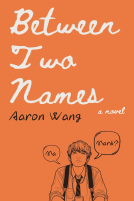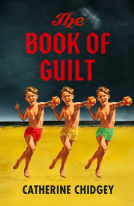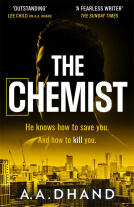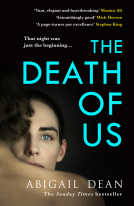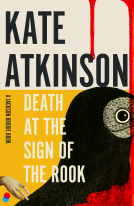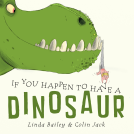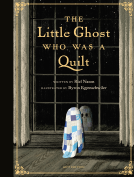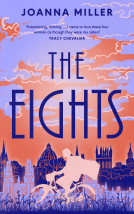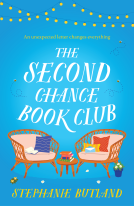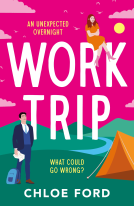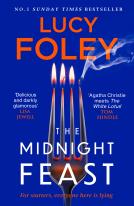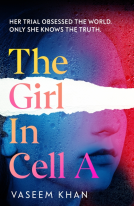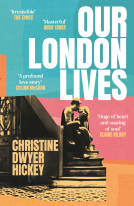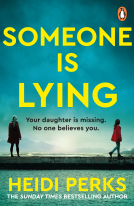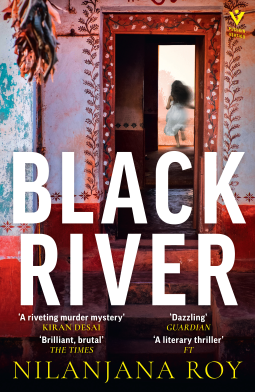
Black River
by Nilanjana Roy
This title was previously available on NetGalley and is now archived.
Send NetGalley books directly to your Kindle or Kindle app
1
To read on a Kindle or Kindle app, please add kindle@netgalley.com as an approved email address to receive files in your Amazon account. Click here for step-by-step instructions.
2
Also find your Kindle email address within your Amazon account, and enter it here.
Pub Date 24 Sep 2024 | Archive Date 16 Jul 2024
Pushkin Press | Pushkin Vertigo
Talking about this book? Use #BlackRiver #NetGalley. More hashtag tips!
Description
NAMED A BEST BOOK OF THE YEAR BY THE GUARDIAN, THE SUNDAY TIMES, AND THE FINANCIAL TIMES
A searing debut set in a modern India simmering with the tension of growing religious intolerance, by a major new international voice
This shockingly powerful “psychological thriller” and “riveting murder mystery” is “a magnificent work of literary fiction” perfect for fans of AGE OF VICE and WHERE THE CRAWDADS SING (Kiran Desai, Booker Prize winning author)
Teetapur, an unassuming village just a few hours outside of bustling Delhi, is famous for nothing—until one of its children, 8-year-old Munia, is found dead, hanging from the branch of a Jamun tree.
In the largely Hindu village, suspicion quickly falls on an itinerant Muslim man, Mansoor Suspicion ignites like wildfire, fueled by religious tensions that simmer beneath the surface.
The responsibility of uncovering the elusive truth – and prevent the lynching of the prime suspect – now rests on the weary shoulders of Sub-Inspector Ombir Singh. With only one other officer beneath him, and just a single working revolver between them, can he bring justice to a grieving father and an angry village – or will Teetapur demand vengeance instead?
Offering readers a gripping mystery and a sweeping state-of-the-nation saga, Black River stands as a searing critique of modern India, weaving an intricate narrative that captures the essence of a nation grappling with its own complexities and contradictions.
Advance Praise
“Scratch the itch of those who love a "small community dealing with murder" tale with Nilanjana Roy's latest, set in Teetarpur, outside Delhi, "an hour's drive down silent, forested roads covered in powdered summer dust.” — Observer, Best crime novels and thrillers of the year
“A literary thriller of considerable acumen with a textured picture of a country.” — Financial Times, Best New Crime Books
“A new writer to shout about... Roy brings rural India and Delhi to life as much as she does her characters... Riveting.” — Observer
“A novel that is on the one hand a wholly satisfying murder mystery, but which also employs the village of Teetarpur as a kind of India-in-microcosm... A powerful, immersive and unsentimental novel of modern India, Black River establishes Nilanjana Roy as a crime novelist with which to be reckoned.” — Irish Times
“A brilliant, brutal saga that is both an unflattering portrait of modern India and a thrilling crime novel... [An] impressive debut, oozing heat and dust.” — The Times
“Framed as a police procedural, but with the breadth of a saga... [A] dazzling, lyrical tale of friendship, love and grief that shines a light on the corruption and religious sectarianism of modern India.” — Guardian
“This impressive debut is written with great humanity, as well as with incisive clarity... The plot, characterisation, location and writing is first-rate.” — The Critic
“A powerful slice of literary police procedural... This reflective whodunnit transcends the genre's limitations with its delicate handling of humane relationships... A page turner with an extra dimension.” — Crime Time
“A poignant and gripping story, but also a comment on religious intolerance, corruption in politics and issues that affect the rural community particularly, such as politics and gender. A tough but truly relevant read, at times beautifully and exquisitely written but absolutely heartbreaking. A scorching critique of modern India.” — Crime Time Podcast
Available Editions
| EDITION | Other Format |
| ISBN | 9781782279440 |
| PRICE | US$17.95 (USD) |
| PAGES | 352 |
Available on NetGalley
Featured Reviews
A beautifully written noir! I love to read novels with a political undertone, and the social commentary in this about the Hindu-Muslim divide, the Caste system, pollution, wealth disparities and so on in India was very well done in my opinion - it fit well with the narrative and didn’t disrupt it. A perfect ending too, bittersweet just like many other aspects of this wonderfully told story.
Many thanks to Pushkin Press and NetGalley for this ARC!
 Mohit G, Reviewer
Mohit G, Reviewer
An absorbing story and a great read. This was my first book from the author. Looking forward to future works
On the surface and in the immediate, Black River is a story about a man whose daughter is murdered and the challenges that come with managing his grief and the ineptitude of the local police. However, the story is so much more about people’s life journeys to become their true selves and to do what’s right.
Filled with big moral and ethical choices, this story takes place in Delhi and examines the wealth gap, the religious tensions on the micro- and microcosmic levels.
I picked it up as it was touted to be a psychological thriller of interest to those who enjoyed Where the Crawdads Sing. The description wasn’t wrong.
 Bharti C, Reviewer
Bharti C, Reviewer
Black River presented some dark realities of our society with corruption, neglect, power abuse in which innocence,hope and humanity gets lost and crushed to death. An emotionally harrowing sequence of events with tiny bits of respite in between, I was immersed in the story and will call it a good reading experience.
 sara a, Reviewer
sara a, Reviewer
This is simply superb! It's an easy five-star for me. The sense of place that the author creates is absolutely amazing. I could practically smell the air as she describes it. The beginning is quite a jolt and I wondered how the author would take it from there. It did not disappoint as we learned the back story up until the incident. The characters come alive on the pages and though to me, the perpetrator of the crime seemed obvious from the beginning, that did not detract from the story because the writing is so good and gives you the whys behind the facts. I can't wait to read more from this author.
Thank you to NetGalley for an advance copy of this book. It's a total winner!
Although this story is set in a contemporary India, it seems quite historical in telling. The scene is set in a tiny Hindu village of Teetapur. We are first hand witnesses to the death of young girl and the wrongly accused Muslim man. The burning question is, can Inspector Ombir Singh determine who is truly the murderer, and can he convince the village?
The story is a slow burn and more literary than murder mystery (or mystery at all). The insights to life in rural India and contemporary issues that most countries face were interesting and well embedded in the story. Enjoyable ! #pushkinpress #blackriver #nilanjanaroy
 Shirley S, Reviewer
Shirley S, Reviewer
I found this book to be an interesting read. The murders take place early in the book. I loved the descriptions of rural India and the social commentary on religious intolerance and corruption.
The middle part of the book moves away from the murder to give the backstory of the victim's father. It describes the difficulties of the poor in Delhi and the disparity between rich and poor. While this is interesting, those looking for a gripping thriller may be disappointed.
The book is well-written and I would like to read more by this author.
Thanks to NetGalley and the publishers for an arc in exchange for an honest review. All opinions are my own
 Bookseller 1405765
Bookseller 1405765
I loved this book and I want now to find other Nilanjana Roy's books. I loved her style of writing and the storyline of this book. It's a great page turner and you constantly want to continue reading to find out what will happen. It gives also an interesting insight into Indian's life from a specific point of view. I really enjoyed it and I look forward to read the other books of this new discovered author. Thank you Pushkin Press for providing this book for review consideration via NetGalley. All opinions are my own.
Nilanjana Roy is a journalist, so it is no surprise that her crime novel Black River has much more on its mind than the horrific crime that it opens with. Roy wants to use that event to explore some of the flash points in modern India – religious intolerance, rampant development, corruption. But also to explore how despite all of those pressures people still look out for and support each other, or step outside of the box that society has tried to put them in.
Black River opens with eight-year-old Munia and her father Chand who farms a small plot of family land on the edge of the small Indian village of Teetarpur, a few hours outside of Delhi. Not long after this brief introduction Munia is killed after witnessing the murder of another woman. Munia’s body is discovered by Mansoor, a local vagrant who is immediately accused of the crime despite a lack of evidence. The local police are under pressure not just from their superiors to charge Mansoor and also from the townsfolk to release him into their custody so that they can impose their own form of justice.
Before much of the investigation happens, Roy takes readers back for a lengthy digression into Chand’s history. How he left Teetarpur as a young man and the life he made for himself in Delhi before returning. This, more than anything, provides the shape of Black River which is as interested in the villagers, the local police and their relationships as it is in the solving of the crime. Much is made, for example, of the lives of two of Chand’s Muslim friends from Delhi – the butcher Badshah who gives him a job and livelihood and Rabia the wife of his best friend – who face religious intolerance in their neighbourhoods. Roy also focusses on the lead local investigator Ombir who takes regular cash payments and other inducements from the local landowner Jolly Singh but keeps digging even while he is under pressure not to investigate.
The crime itself and its investigation lifts a rock on much that is plaguing modern India. The corruption and graft that seems to infect every part of life, the exploitation of the poor and vulnerable, the weaponisation of religion. But Roy is also alive to a sense of community - of the people who rally around and support Chand, of Ombir’s drive to find justice for Munia despite what it might do to his career prospects. And focussing on these characters Roy finds a way to bring light and hope into what is otherwise a pretty dark story.
Black River fits squarely within the global phenomenon of ‘rural crime’, which has been a calling card for many Australian authors. And as usually in this type of crime novel, the small town setting is used as a microcosm of larger issues affecting the country as a whole but in a way that readers can grab hold of. Roy uses this setting extremely well and uses her journalistic eye to investigate and illuminate a range of dark and worrying issues. But she manages to do so with compassion and a deep understanding of her characters and their lives, so that even when those characters go to dark places readers will be willing to go with them.
 b j, Educator
b j, Educator
This was a wonderful read. It was such a moving emotional story. While the murder of a young girl, Munia, in a remote village outside Delhi forms the thread throughout the story, it is the key characters of Chand, the bereaved father and Ombir the policeman who give real depth to this book. As they grapple with the outcomes and consequences of the tragic death, we learn so much about power and corruption and the growing intolerance of Hindus towards Muslims. It is a riveting read
 Pauline V, Reviewer
Pauline V, Reviewer
I was expecting a gritty mystery from faraway Indian shores, and yes I am guilty of picking this book up in part because it looked exotic… but that’s not the only reason, and that’s not all I got from the experience. It was moving and eye-opening and I really felt for the characters. There’s friendship, corruption, love and loss, and the writing made me feel like I was there with all of them.
A little girl gets murdered in a tiny village not too far from Delhi. She’s the young daughter of a widowed farmer. The local police force is just a pair of well-meaning officers who don’t want to botch the job and jump onto conclusions like the rest of the villagers, but the truth is that they lack resources and time. Villagers have already almost lynched the feeble-minded Muslim vagrant who seemed all too obvious. The investigation gets solved to the satisfaction of the officials and the powerful guys in town, but there’s more to it.
I work with Indian people on a daily basis. I got the opportunity to travel for a few days to India at the beginning of this year and I couldn’t make heads or tails of what I briefly saw within this very short time. All I can say is that I hadn’t realized how different India is from my own cultural references. That’s a few of the reasons why I picked this book and it didn’t disappoint.
I had not expected that the divide between Hindus and Muslims would figure so prominently in the novel. I had vaguely heard of nationalist and discriminatory measures but the book shows what it all means on a daily basis: people being scared for seeing friends of the other religion, slums being segregated, violent bullies making threats against people for celebrating a wedding in a quiet way, overtly racist banners making Muslims unwelcome in the village… In the book it is all the more effective as the protagonists take it in stride, with deep sadness but no real surprise.
The book is a noir with some pretty intense themes and scenes, but to me it still manages to keep a little flicker of hope. Warmly recommended.
Thanks to the publisher and Netgalley. I received a free copy of this book for review consideration.
 Rosalind S, Reviewer
Rosalind S, Reviewer
This is a mix of police procedural, murder mystery, and social commentary. The book is set in a village in India. 8-year-old Munia is murdered and her father and the village will not stop until justice is served. The village police want to follow the law and procedures but face increasing demand for vigilante justice. Alongside the main story, the book explores wider themes such as violence against women and children, religious bigotry, grief and loss, class divides, cultural practices, and societal change.
The story follows multiple POV and is set over different timelines. It is beautifully written, and Roy brings the characters and the setting to life. This was not my idea of a fast-paced book. The story takes a meandering journey across the decades and is arguably a look at Indian culture rather than being a tense thriller. But it has its harsh and brutal moments. The story is engaging and thought-provoking.
With thanks to the author and Netgalley for providing a copy of the book. This is my honest review, which I'm leaving voluntarily.
Thanks Pushkin Press and NetGalley for ARC.
Oh my, this is an absolutely first class novel, hard to believe it's a debut. Beware, as it contains heart breaking and triggering content including violence including against women and small children as well as shockingly well rendered detail of life on the margins.
Police procedural set in a village where the police rely on the local people for their survival, particularly the wealthiest, literary thriller examining the state of the nation with Hindu set against Muslim, urban sprawl and the potential for profit widening inequalities and worsening the plight of the most vulnerable, generational saga, and heartfelt exploration of the consequences of violent death on the bereaved, the wider community and the underlying tensions between rich and poor.
It's never less than compelling, beautifully written and it has stayed with me. Not an easy read but well worth it for me.
This story is horrifying from its start, with the two murders kicking off the action, to its end, with another murder to bookend this dark and grief-filled story.
A sex worker then an eight-year-old child are murdered, but it’s the death of the child, young Munia, that destroys her father, and excites the anti-Muslim rhetoric in the village calling for the lynching of a mentally ill man who found the hanged girl.
In an effort to prevent the villagers from killing Mansoor, the police officer for the village, Ombir know that unless he can provide a couple of other semi-credible suspects, the soon to arrive Delhi-based investigator will wonder what he was up to. Ombir does some very minimal investigating, and finds some criminals, and the dead sex worker, then dismisses her as irrelevant to Munia's case.
While the father Chand begins to deal with his grief, author Nilanjana Roy gives us this man’s backstory: though born in this village, he wanted more and ended up in Delhi, working all manner of terrible jobs and squatting with two Muslim friends. The two friends got married eventually, and Chand eventually returned home to farm and marry, though he kept in touch with Rabia after her husband died. Though not fond of the work, with a wife and girl to support, Chand did his best to keep his fields producing, which were next to the fields of the richest man in the neighbourhood, who owned that farm, a factory, and a variety of other properties. Always looking to add more to his holdings, the man has big plans for the area, seeing it becoming more important to Delhi eventually with development. He also has an outsize influence on the villagers.
We also learn more about Rabia, who, after her husband died, made a life for herself in Delhi. We also learn more about the personal life of Ombir, who fails in his duty to find justice for the girl, then has a change of heart, quietly reinvestigating the case on his own, exposing corruption, blackmail, and sex trafficking. All the while, we see Islamophobia in Delhi and in the village; the small-mindedness and anti-Muslim sentiments and actions by Hindus (e.g., segregation and brutality) was infuriating, but felt appropriate for this story.
There were few credible suspects for the murder, but the identity of the killer was actually less interesting than the bigotry, corruption, criminality and injustice permeating the story, which, incidentally, is not a thriller. The pacing and pages devoted to character deep dives ensure this is very much more of a literary fiction novel.
Incidentally, much as I loved learning about Rabia, her section feels a little misplaced in this story, unlike Chand's history.
Other than that, I thought this was a wonderfully written, ugly story that hurt my heart as I was reading it.
Did I like this novel. Yeah, I did. Was it hard to read occasionally? Yeah, it was. But this book was well characterized, with interesting interactions between the many flawed and grey characters.
Thank you to Netgalley and to Pushkin Press for this ARC in exchange for my review.
